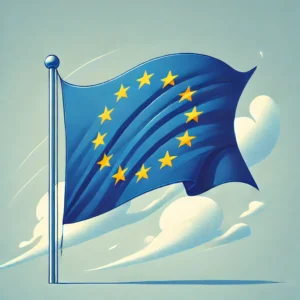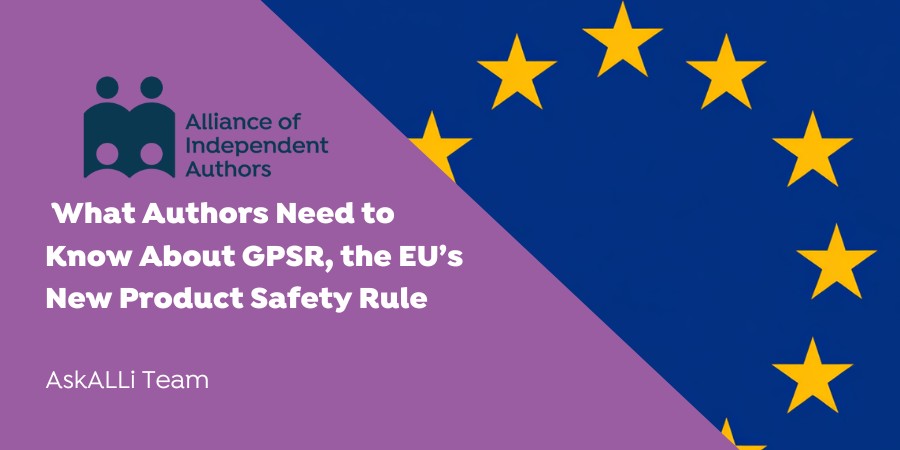If you're an indie author selling books in the European Union, you’ve probably heard about the new General Product Safety Regulations (GPSR) 2024. These rules came into effect on December 13, 2024, and they’re shaking things up for anyone selling physical products—including books—into the EU market.
At first glance, GPSR might sound like something meant for manufacturers of electronics or toys, but this legislation applies to almost all physical goods, and yes, that includes your paperbacks. While the idea of ensuring product safety might seem far removed from the world of books, the regulations now require authors and publishers to meet specific compliance standards to continue selling their works in the EU.
So, what does this mean for you as an indie author? Do you need to hire an “EU Responsible Person?” What happens if you sell through Amazon or your own eCommerce site? And how much of this is actually going to affect your bottom line? In this post, we’ll tackle these questions and more, breaking down what GPSR is, why it matters, and how to navigate it without getting lost in a sea of red tape.
What is GPSR, and why does it affect books?
 The General Product Safety Regulation (GPSR) 2024 is a new European Union law aimed at ensuring the safety of almost all physical goods sold in the EU. It came into force on December 13, 2024, and replaced the older General Product Safety Directive. Unlike its predecessor, GPSR is much broader in scope, covering nearly all products unless specifically excluded.
The General Product Safety Regulation (GPSR) 2024 is a new European Union law aimed at ensuring the safety of almost all physical goods sold in the EU. It came into force on December 13, 2024, and replaced the older General Product Safety Directive. Unlike its predecessor, GPSR is much broader in scope, covering nearly all products unless specifically excluded.
Books are included in these regulations because they are physical products being sold into the EU market. While books might not seem like items with safety concerns, the law requires all physical goods to meet certain traceability and labelling standards, regardless of their nature. For example, every book must now include information about the manufacturer, an EU-based “Responsible Person,” and other identifiers to ensure compliance. This includes books sold directly through websites, on platforms like Amazon, or even as part of subscription tiers (e.g., on Patreon).
It’s important to note that these rules apply to books placed on the EU market after the enforcement date. Books already in circulation before December 13, 2024, are generally not subject to these new requirements unless they are reprinted after this date. This makes GPSR especially relevant for indie authors who regularly print on demand or sell physical copies in the EU.
Does GPSR impact eBooks or digital goods?
No, GPSR only applies to physical goods. This means eBooks and other digital products are not affected by the regulation. If you primarily sell digital formats like Kindle eBooks or PDFs, you don’t need to worry about GPSR compliance.
However, if you sell physical books alongside your digital offerings—such as paperbacks or special edition hardcovers—you’ll need to ensure those physical products meet the GPSR requirements. The regulation specifically targets items that are manufactured, shipped, and sold as physical goods in the EU, leaving digital content entirely out of its scope.
What are the key requirements for compliance with GPSR?
GPSR sets out several requirements that authors, publishers, and other parties in the supply chain must follow to ensure their physical products, including books, meet EU safety standards. Here are the main compliance elements:
- EU Responsible Person: Every product sold in the EU must have a designated EU-based “Responsible Person.” This person or entity is responsible for addressing safety queries and ensuring the product complies with GPSR requirements.
- Traceability Information: Products must include information such as a unique identifier (e.g., ISBN for books), batch details for traceability, and contact details for the manufacturer and the EU Responsible Person. This information should be clearly marked on the product or its packaging.
- Safety Assessments: Manufacturers must conduct safety assessments for their products and maintain detailed documentation of these assessments, including records of any issues that arise.
- Online Sales Platforms: If books are sold through platforms like Amazon or eBay, those platforms must display the product's compliance information, including details about the EU Responsible Person and the manufacturer.
These requirements may sound daunting, but many printers and services, such as Bookvault, are stepping in to handle compliance on behalf of authors and publishers. If you’re printing your books with a provider like Bookvault, much of this process may already be taken care of for you.Bottom of Form
How can indie authors comply with GPSR requirements?
Indie authors can ensure compliance with GPSR by taking the following steps:
- Use a Compliant Printer: Many print-on-demand services, such as Bookvault, have already taken measures to comply with GPSR. They’ve appointed an EU Responsible Person, added traceability details to books, and conducted safety assessments. If you exclusively use a compliant printer like this, most of the work is already done for you.
- Appoint an EU Responsible Person: If you’re printing through multiple providers or managing some aspects independently, you’ll need to appoint your own EU Responsible Person. Services like EAS (Easy Access System Europe) specialize in this and can handle compliance for your books.
- Update Documentation and Labelling: Ensure all your books include the required compliance information, such as details about the manufacturer, the EU Responsible Person, and batch identifiers.
Working with a reliable printer or compliance service can help simplify these steps, so you can focus on writing rather than navigating regulatory complexities.
What if I sell books printed by multiple printers?
If you use multiple printers, you’ll need to coordinate compliance across all your providers. Here’s what to consider:
- Check Each Printer’s Compliance: Confirm whether each printer has appointed an EU Responsible Person and whether they’re adding the required information (e.g., manufacturer details, batch identifiers) to your books.
- Keep Records Organized: If different printers use different EU Responsible Persons, make sure you maintain clear records showing which Representative applies to which titles.
- Inform Sales Platforms: For platforms like Amazon or eBay, you’ll need to upload compliance information for each product. This might include declaring which EU Responsible Person is tied to each book, especially if you use multiple printers.
Coordinating compliance can be more complex when working with multiple printers, so staying organized and proactive is key.
How does GPSR affect sales on platforms like Amazon and eBay?
 Sales on platforms like Amazon and eBay require specific compliance actions under GPSR:
Sales on platforms like Amazon and eBay require specific compliance actions under GPSR:
- Compliance Information: You’ll need to upload details about the manufacturer, EU Responsible Person, and any required safety documentation, such as a Declaration of Conformity, to your product listings.
- Regular Monitoring: Platforms like Amazon are actively removing non-compliant listings from EU marketplaces. Checking your Seller Central account for flagged listings or additional requirements is essential to keep your books available.
- Dual Responsibility: If you sell directly on these platforms while your printer (e.g., Bookvault) also lists your titles, you’ll need to ensure there’s no conflict between the compliance data you provide and the printer’s data.
Following these steps can help ensure uninterrupted sales in the EU while avoiding compliance issues.
Do I need to worry about GPSR for my own eCommerce site?
Yes, if you sell physical books through your own eCommerce website (e.g., Shopify), you must also comply with GPSR. This includes making the same compliance details—such as the EU Responsible Person, manufacturer information, and safety documentation—visible to customers. While there’s no immediate risk of your site being removed, as might happen on Amazon or eBay, failure to comply could result in legal or regulatory issues.
If you’re using a printer like Bookvault, which handles much of the compliance work for you, be sure to add their provided information to your website’s product listings. Being proactive about these details will help you avoid complications down the line.
What is a Declaration of Conformity, and how do I create one?
A Declaration of Conformity (DoC) is a document that certifies a product meets EU safety requirements under GPSR. It is required for certain platforms, like Amazon, and must be available in the language of the marketplace (e.g., French for Amazon.fr, Spanish for Amazon.es).
For authors using compliant printers like Bookvault, templates for Declarations of Conformity are often provided in multiple languages. You’ll need to fill out the template with your book’s information and upload it to the relevant sales platform as part of your compliance documentation. This is an important step to ensure your listings remain active in the EU.
What support is available for SMEs and indie authors?
The EU has acknowledged the challenges GPSR poses for small and medium-sized enterprises (SMEs) and plans to release guidelines tailored to their needs. These guidelines will help businesses understand and meet their obligations under GPSR.
In addition to EU-provided resources, services like EAS (Easy Access System Europe) specialize in compliance support. Companies like Bookvault also handle most of the regulatory burden for authors using their services. For indie authors, joining groups like ALLi can be invaluable for navigating GPSR, as members share advice and practical solutions specific to publishing.
What happens if I don’t comply with GPSR?
Non-compliance with GPSR can lead to serious consequences, including:
- Removal of Listings: Platforms like Amazon and eBay are actively delisting non-compliant products from their EU sites. If your books don’t meet GPSR requirements, they could disappear from these marketplaces.
- Legal Risks: Selling non-compliant products in the EU could result in fines or other penalties.
- Lost Sales Opportunities: Non-compliance may force you to stop selling physical books in the EU altogether, cutting off a valuable market.
Taking steps now to ensure compliance will help you avoid these risks and keep your books available to readers in the EU.
Conclusion
The new GPSR regulations may feel like a significant hurdle for indie authors, but with the right steps, you can navigate them effectively. By understanding the requirements—like appointing an EU Responsible Person, ensuring proper labeling, and updating compliance information—you can keep your books available to readers in the EU without disruption.
Services like Bookvault and EAS can take much of the burden off your shoulders, handling compliance details so you can focus on what you do best: creating great books. If you sell on platforms like Amazon or your own eCommerce site, staying proactive about updates and documentation will ensure you remain compliant and competitive in this important market.
While regulations like GPSR can seem daunting at first, they’re an opportunity to professionalize your publishing processes and reach more readers with confidence. With resources, community support, and careful planning, indie authors can continue to thrive in the EU market.
Thoughts or further questions on this post or any self-publishing issue?
 If you’re an ALLi member, head over to the SelfPubConnect forum for support from our experienced community of indie authors, advisors, and our own ALLi team. Simply create an account (if you haven’t already) to request to join the forum and get going.
If you’re an ALLi member, head over to the SelfPubConnect forum for support from our experienced community of indie authors, advisors, and our own ALLi team. Simply create an account (if you haven’t already) to request to join the forum and get going.
Non-members looking for more information can search our extensive archive of blog posts and podcast episodes packed with tips and advice at ALLi's Self-Publishing Advice Center.





I would please appreciate further guidance on this beyond being referred to the community chat which is a lot to navigate. It seems GPSR applies to digital products as well as physical products. I’ve read in some places it applies to Northern Ireland too. I see a lot of conflicting advice. I’ve considered the idea of not selling to EU but as NI is part of UK, if I stop selling to NI I also lose UK sales. If I pay a company to do EU rep for me it costs more than I earn a month. As an indie author, I’m reluctant to list myself as an EU rep as don’t want to put my own address in a copyright page or set myself up for something I don’t understand. If I only sell with one printer, I potentially earn less per book because of limited expanded distribution options. I want to do it right, but it’s hard to know what right is. Do we know when clarification guidelines will be provided? Are there examples of what it looks like when done right? Thanks.
I think that this might be outdated? The FAQ published by the EU seems to clearly included digital products. If so, can this be updated or clarified? I see this article shared a lot, but it contradicts a lot of other sources, including the faq published by the European Commission
“It’s important to note that these rules apply to books placed on the EU market after the enforcement date. Books already in circulation before December 13, 2024, are generally not subject to these new requirements unless they are reprinted after this date. This makes GPSR especially relevant for indie authors who regularly print on demand or sell physical copies in the EU.”
This paragraph is unclear. Books already in circulation – are those only the actual copies that have been received within the EU? Or are they titles, specific editions and printings, even if some of the physical copies have not yet been shipped to the EU?
Thank you for this article. While Ingramspark and Bookvault have published their european resposible person which is helpful for authors using those services. Do you know how I can find the equivalent for print books published via kdp print on demand (amazon)?
Hey, thanks for putting this together 🙂 I had a question, because I’m not sure this is correct when you say that it only applies to physical goods… From the FAQ on the official website, it states: “The GPSR applies to all types of products (physical or digital products too, including software)
that are placed or made available on the EU Single Market, as long as there are no specific
provisions with the same objective under Union law which regulate the safety of the products
concerned (e.g. childcare articles, furniture, gymnastic equipment, etc.).”
It also states it applies to products provided for free.
(https://ec.europa.eu/safety-gate/#/screen/pages/obligationsForBusinesses)
As such, I’m trying to obtain clear answers on whether things like my ARC team are affected as well, but having read this article I’m less certain than before. Could you please point me to the official clarification you’ve used to state the legislation only applies to physical products? Hoping you’re right, as it will halve my problems!
Cheers